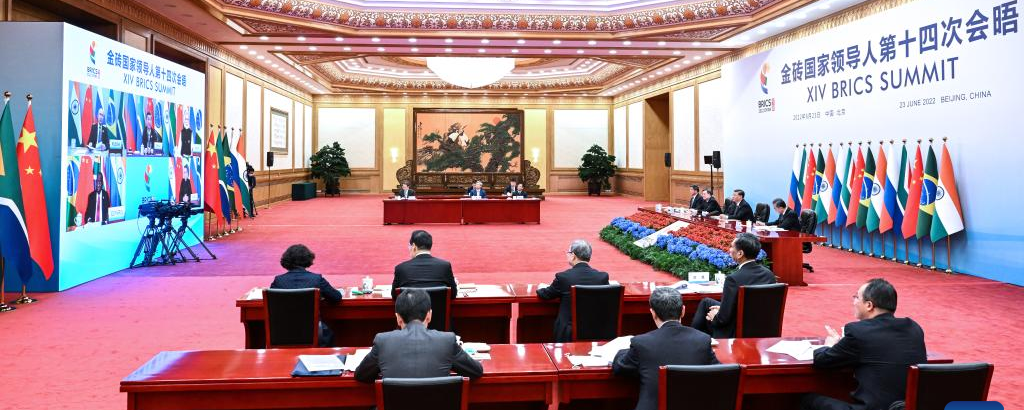No. 7
September 2022
International Matters of Concern
Significant International Meetings
May, June, July 2022
• World Economic Forum in Davos, Switzerland
May 22-26
• Ninth Summit of the Americas in Los Angeles, U.S.
June 10-16
• Commonwealth Heads of Government Meeting in Kigali, Rwanda
June 20-25
• 14th BRICS Summit Hosted by China
June 23
• Council of European Union Meeting in Brussels, Belgium
June 23-24
June 26-28
• NATO Summit in Madrid, Spain
June 28-30
• G20 Foreign Ministers Meeting in Bali, Indonesia
July 7-8
• Indo-Pacific Chiefs of Defense Conference in Sydney, Australia
July 25-27
Video
• Protests at the
G7 Summit in Germany
Significant International
Meetings in May, June and July, 2022
World Economic Forum in Davos, Switzerland, May 22-26
Annual Meeting in Davos, Switzerland
The World Economic Forum (WEF) yearly gathering of the global oligarchy in Davos, Switzerland had a different makeup this time compared with recent meetings. Davos 2022 reflected the intensified global contradictions brought on with the pandemic and the war provocations of U.S./NATO expansion in eastern Europe and Russia's forceful response to defend its legitimate national security.
The WEF is led and dominated by those pushing a neo-liberal global agenda of privatization, destruction of social programs, a war economy, forcible regime change in sovereign nations through war, and opposition to working people's right to govern themselves. It promotes the formation of cartels and coalitions comprised of oligopolies and narrow private interests of the world's 2,755 billionaires whose combined wealth comes to nearly $14 trillion. (One trillion is equal to one million million.)
Bowing to the dictate of the "west," the WEF prohibited Russian business and government leaders from attending this year's gathering. Also, the increase in U.S. threats against China with warships from the "west" patrolling the Taiwan Strait off China's coast and President Biden's open talk of war with China using Taiwan as the pretext, coupled with the pandemic, meant the usual large number of Chinese business and government leaders at the Davos meeting was greatly reduced.
The total number of participants was down by about 1,000 from previous years to just over 2,000. Attendees included 583 participants from the U.S., 220 from Switzerland, 211 from the UK and 109 from India. Usually many government leaders address the forum but this time the only government leaders who spoke in person or virtually were from Ukraine, Spain, Israel, Qatar and Germany.
The response of U.S./NATO leaders to the growing global opposition to U.S. wars and striving for hegemony has been to refuse to demilitarize and disband NATO, and instead expand it and their war economies and aggressive propaganda. The speeches at Davos by Ursula von der Leyen, President of the European Commission, and Jens Stoltenberg, Secretary-General of NATO, made special mention of turning Europe into a zone of war with the aim to force the imperialist "values of the west" on Russia through a crusade for regime change, and after crushing Russia to extend the battle into China.
In his address to the forum NATO leader Stoltenberg insisted the "west," as the U.S.-led imperialist alliance calls itself, must not trade "long-term security needs for short-term economic interests." With this he demanded the peoples of Europe must suffer in silence the negative consequences of the sanctions against Russia, such as price inflation and lower standards of living across Europe, and accept that more public funds, social wealth and the youth be wasted on war and war preparations.
Stoltenberg said that "freedom is more important than free trade." This rhetoric means U.S./NATO wants freedom for the imperialists to plunder and exploit and to negate the right of sovereign nations to decide their economic affairs including to have trade relations based on mutual benefit and development. His freedom includes the freedom of the most powerful to deny the right of working people to decide those affairs that affect their lives.
Given that the values Stoltenberg upholds are what makes profit, the statement he added was especially incongruous when he said that "protection of our values is more important than profit." Here Stoltenberg calls up the demons of the medieval crusades of the marauding European feudal armies to crush the Islamic world of west Asia and north Africa and occupy their lands and steal their material value. Stoltenberg in no way belittles the profits of the war industries, which are sustained and fattened with the crusades for the "west's" ideological values founded on racism, anti-communism and hatred and fear of working people. He is speaking of the shrinking profits of small and medium-sized enterprises that are being swallowed up by the global monopolies of big business.
For her part, Ursula von der Leyen echoed the NATO leader, saying the Ukraine proxy war must not only defeat Russia but weaken and drive it into "strategic failure" so as to defend European security and the current international order. Countering Russia is a task for the entire global community, she spluttered, attempting to rope in the sceptics in the crowd from Asia, Africa, central and south America, the Caribbean and the many doubters from Europe unwilling to join the crusade. She boasted of seizing Russia's "assets" wherever they could be found to put towards a new "Marshall plan for Ukraine" to ensure U.S./NATO does not lose, and presumably has the strength to march against China.
Von der Leyen's comments were met with some scorn as everyone knows that the EU itself is far from united on sanctions. Many leaders in Europe are discussing how to circumvent the EU's own sanctions against Russia as they know their economies are collapsing into chaos and the people want relief from the crisis.
Davos 2022 contributed nothing to sorting out any problem on any front.
Ninth Summit of the Americas in Los Angeles, U.S., June 10-16
Anti-Democratic Summit of the Americas
Ends Badly for U.S.
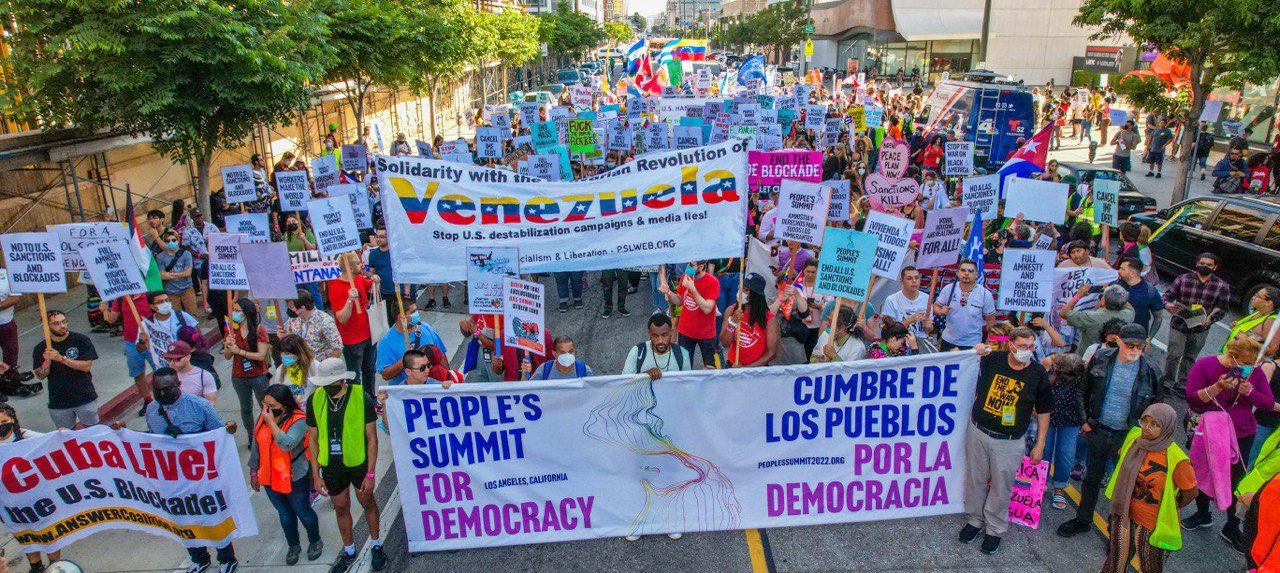
People's Summit organizes march outside the Summit of the
Americas in Los Angeles, June 10, 2022.
The Ninth Summit of the Americas held in Los Angeles from June 6-10, with a theme of "Building a Sustainable, Resilient, and Equitable Future" for the hemisphere, did not end well for its host, U.S. President Joe Biden and his government.
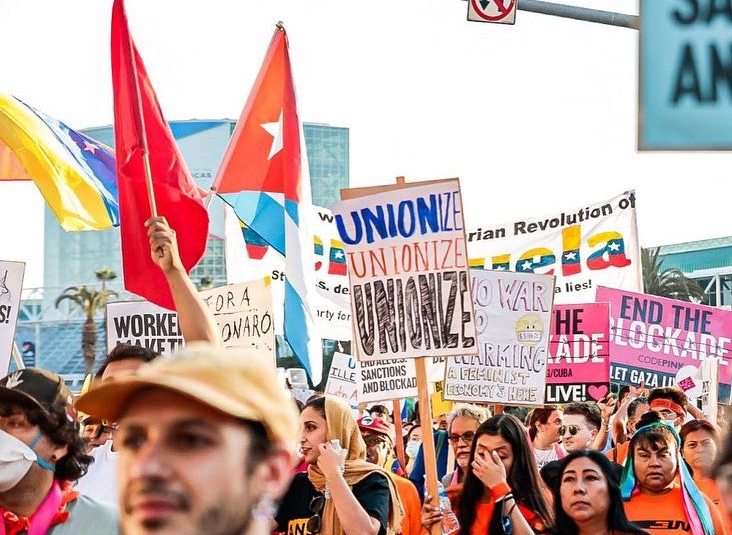 In anticipation of the event the
U.S., as Chair and Host, announced that the 9th summit would
"work with the region's stakeholders toward securing
leader-level commitments and concrete actions that dramatically
improve pandemic response and resilience, promote a green and
equitable recovery, build strong and inclusive democracies, and
address the root causes of irregular migration." Without a shred
of irony it added that "Our commitment to diversity and
inclusion will underpin our efforts."
In anticipation of the event the
U.S., as Chair and Host, announced that the 9th summit would
"work with the region's stakeholders toward securing
leader-level commitments and concrete actions that dramatically
improve pandemic response and resilience, promote a green and
equitable recovery, build strong and inclusive democracies, and
address the root causes of irregular migration." Without a shred
of irony it added that "Our commitment to diversity and
inclusion will underpin our efforts."
Ten heads of state and government -- the three arbitrarily excluded (Cuba, Venezuela and Nicaragua) and seven others -- did not attend. At least one country whose leader boycotted the event, St. Vincent and the Grenadines, did not even send a lower level representative. Prime Minister Ralph Gonsalves explained his decision, saying, "If you invite me to come to your house and I say, as a matter of principle, I ain't coming because you shouldn't be excluding people, how could I then send somebody else?"
Many leaders who did attend in person or virtually, especially from the Caribbean Community (CARICOM), but others as well, spoke out against Cuba, Venezuela and Nicaragua being excluded by the host. Canada's prime minister was not among them.
What Biden Said
In his address to the opening session of the Plenary on June 9 Biden said the summit was "an opportunity to find ways we can do better for all of our people by working together," saying his emphasis was on "together" to show "our people" the power of democracies to deliver when democracies work together.
He went on to list what he said were his administration's commitments to "our region," starting with his Action Plan on Health and Resilience. He said a new Americas Health Corps would help "our region" recover from COVID-19, and "our ability" to respond to future health emergencies. He stated it would train 500,000 public health care and medical professionals, so when the next pandemic hits we'll be ready [with] trained health care workers to administer the vaccines and the needed care, which we don't have now. He added, "And it won't cost your countries anything."
How many who heard what he said believed Biden's claim that the U.S. -- with its negligent management of the pandemic, hoarding of vaccines and its big Pharma monopolies' extortion of poor and developing countries seeking to acquire vaccines -- could be relied on to get them ready for the next pandemic? Is it any wonder he did not want Cuba present when he made his "generous" offer? Cuba, with its world renowned public health system and vaccines, saved many more lives and managed the pandemic far more rationally and humanely than the U.S. It did so while also helping other countries battle the pandemic even as the U.S. tightened the screws on its economy, making it harder than ever for Cuba to acquire much needed life-saving medicines and supplies for its people.
Some other things Biden said about his administration's self-serving "action plan" to increase its penetration and control over the region include:
- strengthening the clean energy economy in the Americas by promoting trade and investment in green energy; and
- democracy promotion with an Inter-American Action Plan on Democratic Governance.
Biden seemed to think he could convince those present to ignore the elephant in the room that all the talk of working together, being partners, and shared this and that is designed to conceal. The aim of the U.S. is to reassert its hegemony in the face of the growing influence in its "back yard" of China and Russia, and suppress at all costs the growing efforts of peoples and countries of the Americas to get out from under the yoke of U.S. imperialism in order to pursue their own models of governance, development and integration.
At the summit's conclusion on June 10 he put forward a "Los
Angeles Declaration on Migration and Protection." Full of
high-sounding policy objectives that clash with his own
government's practices, it was signed by only 20 out of the 35
countries in the Americas.
In the end, Biden's stubborn insistence on barring Cuba, Venezuela and Nicaragua over the opposition of so many got the results it deserved. Without a doubt the Los Angeles Summit ended up as a self-inflicted debacle for Biden and the U.S. It also exposed the cowardice and lack of principles of liberal appeasers like the Trudeau government which could not bring itself to utter even a peep about the unacceptability of the U.S. abusing its host country status and excluding three countries it has targeted for regime change from what it calls a hemispheric forum.
Leaders Denounce U.S. Policy at Summit
John Briceño, Prime Minister of Belize and Chair of the Caribbean Community (CARICOM):
[....] The power of the Summit of the Americas is the space it provides for all the countries of the Americas to dialogue and agree on joint actions. The Summit belongs to all of the Americas.
It is therefore inexcusable that all countries of the Americas are not here, and the power of the Summit [is] diminished by their absence. It is incomprehensible that we would isolate countries of the Americas which have provided strong leadership and contributed to the hemisphere on the critical issues of our time.
Cuba has provided consistent, unmatched cooperation in health to almost two-thirds of the countries in this hemisphere including Belize. Cuban health care experts of the Henry Reeve Brigade were on the frontline in the very early and uncertain days of Belize's COVID-19 response. Many Belizean doctors and healthcare professionals are trained in Cuba. The illegal blockade against Cuba is an affront to humanity. It continues to cause untold suffering. It is inconsistent with our values. In fact, it is unamerican.
The time has come, Mr. President, to lift the blockade and to build bonds of friendship with the people of Cuba. Similarly, Venezuela has done so much toward energy security for the Caribbean region through its innovative financing programmes. Venezuela's absence is unforgivable.
Excellencies, at this most critical juncture when the future of our hemisphere is at stake, we stand divided. And that is why this Summit of the Americas should have been inclusive. Belize rejects the unilateral right of any country to impose exclusions. We assert, unequivocally, that the principle of inclusivity must be the touchstone of all future summits. Geography, not politics, defines the Americas.
Alberto Fernández, President of Argentina and President of the Community of Latin American and Caribbean States (CELAC):
I would like to begin by expressing my appreciation for the efforts made in organizing this Ninth Summit of the Americas. I regret that not all of us who should have been present were able to be present in this forum so conducive to debate.
Today it is my turn to speak in my capacity as President pro tempore of CELAC. We are the Community of Latin American and Caribbean States. There we live together in diversity and we respect each other. We have different views, but we share similar concerns in this complex present. [...]
From the periphery where we have been located, Latin America and the Caribbean look on with pain at the suffering endured by our brother peoples. Cuba endures a blockade of more than six decades imposed during the years of the "Cold War" and Venezuela suffers another one, while a pandemic ravaging humanity takes millions of lives.
Measures of this type that seek to pressure governments in reality only hurt the people.
We would definitely have wanted a different Summit of the Americas. The silence of those who are absent calls out to us. So that this does not happen again, I would like to make it clear for the future that the fact of being the Summit's host country does not come with the capacity to impose a 'right of admission' on the member countries of the continent.
Addressing Biden directly, Fernández stated:
The years prior to your arrival to the Government of the United States of America were marked by an immensely harmful policy for our region deployed by the administration that preceded you. It is time for those policies to change and for the damage to be repaired.
The OAS [Organization of American States] has been used as a gendarme that facilitated a coup d'état in Bolivia. They took over management of the Inter-American Development Bank, which historically was in Latin American hands. The actions of rapprochement with Cuba, which Pope Francis mediated, that signified progress on the part of Barack Obama's administration while you were vice president, were thwarted. The intervention of Donald Trump's government at the International Monetary Fund was decisive in facilitating an unsustainable indebtedness in favour of an Argentine government in decline. He did it for the sole purpose of preventing what ended up being the electoral victory of our political force. The entire Argentine people is suffering today because of such indecency.
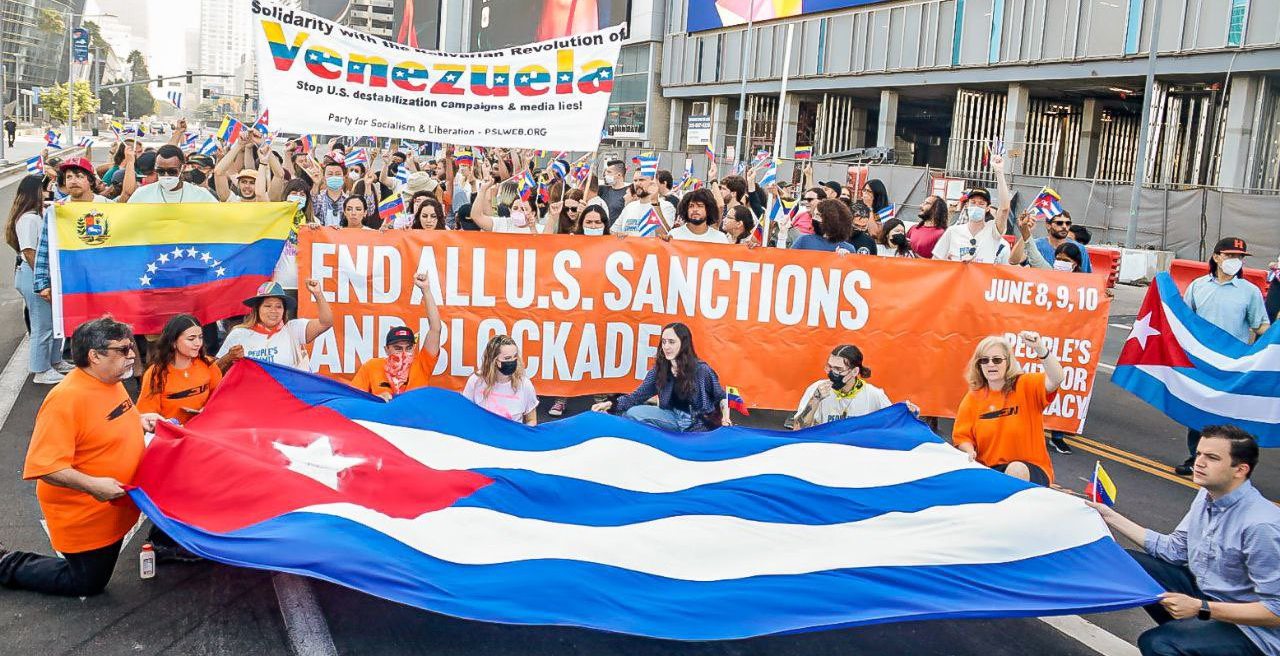
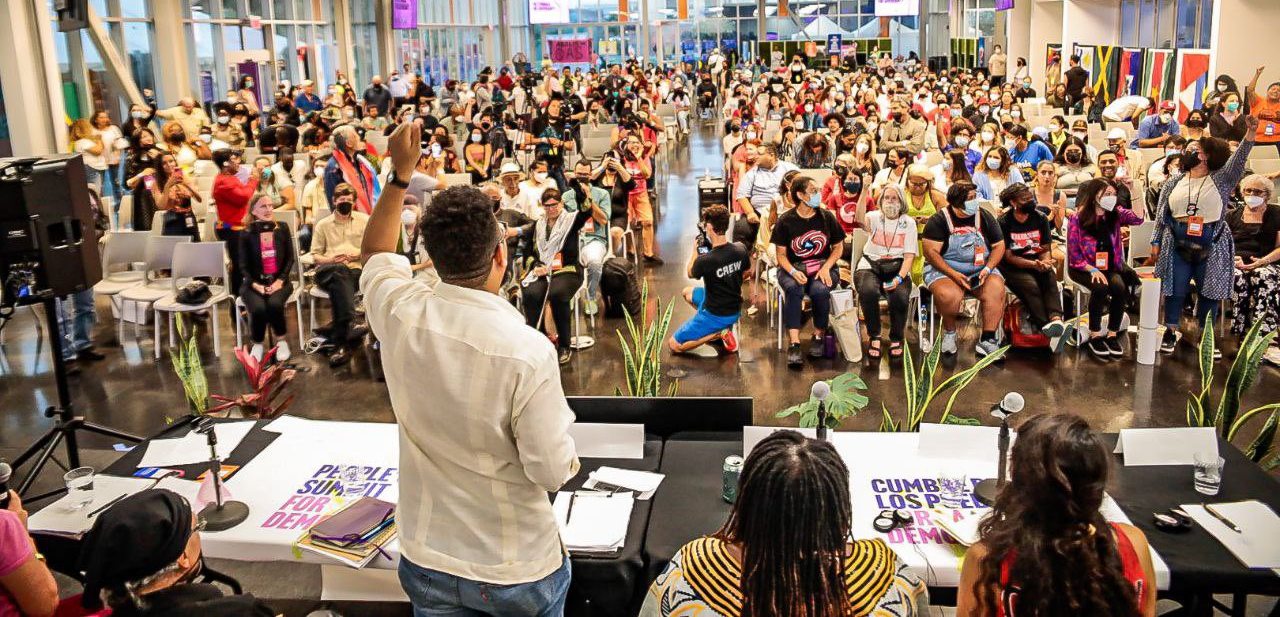
People's Summit 2022, June 8-10, 2022
(Photos: People's Summit)
Commonwealth Heads of Government Meet in
Kigali, Rwanda, June 20-25
African Nations Call for Action to Open Up
Grain Shipments
As people worldwide organized actions in opposition to the 2022 NATO Madrid summit held in June and challenged the very existence of NATO, the Canadian Liberal government continued to act more than ever as a mouthpiece for NATO and the U.S. in various forums. Such was the case at the Commonwealth Heads of Government meeting in Kigali, Rwanda, June 20-25. Prime Minister Trudeau and Foreign Minister Mélanie Joly participated in the 26th biennual meeting of the leaders of the Commonwealth countries on June 25, before attending the NATO Madrid summit. The Commonwealth meeting was attended by heads of state or other government representatives from the 56 members of the Commonwealth, including 21 African nations.
Before leaving for Rwanda Trudeau spoke to the CBC about the conference and his mission. The CBC reported:
"In an interview with CBC Radio's The House, Trudeau said the challenge facing Ukraine's allies is to engage 'in a very, very real and sustained way' with leaders who are sceptical of sanctions to make them 'understand that Russia is trying to destabilize the world and set democracy and the rule of law back by decades.'
"'It's important for everyone, not just European countries, that we be standing up to that attempt to redraw the world order,' he added.
[...]
"The Commonwealth meeting, Trudeau said, will be an opportunity to remind countries that 'they don't have to make nice with Russia' and to underline the fact that Moscow is the 'instigator of all this instability' around the world, particularly regarding food security."
The efforts by Trudeau and British Prime Minister Boris Johnson to have the Commonwealth meeting join in condemning Russia and supporting sanctions failed. At the conference the African countries raised their concerns with food scarcity, which is making their nations suffer. Trudeau repeated the U.S. claim that the cause of food shortages is Russia's illegal actions, including the blockade of key Ukrainian ports and deliberate targeting of grain storage facilities through cruise missile strikes. The fact of the matter is that grain shipments from Ukraine are stopped because Ukraine has mined the ports, making it impossible for ships to leave. Russia has made it clear that exports from Ukraine can restart as soon as Ukraine removes the mines, which it refuses to do.
The chairman of the African Union (AU), Senegal's President
Macky Sall, raised the issue of sanctions. He stated that the
West must lift sanctions against Russia, the largest wheat
exporter, so that grain starts flowing freely to global markets.
He also pointed out that, though food and fertilizer are exempt,
sanctions targeting Russian shipping have made international
shipping companies reluctant to transport Russian cargo. Sall
said that other countries are suffering more from the sanctions
than Russia, in terms of food shortages and increasing
inflation.
As well, Sall and chairman of the AU Commission, Moussa Faki
Mahamat, met with Russian President Putin on June 3, where they
discussed the difficulties faced by African countries stemming
from the U.S. sanctions and ways to further economic and
humanitarian cooperation. Sall said he was "very reassured and
very happy with our exchanges." The meeting was a further
indication of the inability of the U.S. to secure broader
support for the sanctions, with many African countries opposing
them, and its failure to “crush” Russia using them.
The meeting in Kigali brought to light once more that the pro-war and anti-Russia rhetoric -- the very opposite of promoting peace -- taken up with zeal by Canada is being staunchly opposed as nations are seeking concrete solutions to problems plaguing them which are made worse by Western sanctions against Russia. In this respect, they are also expressing their desire for a peaceful settlement of the conflict in Ukraine. Any further increase in sanctions against Russia and extension of the war in Ukraine will have further dire impacts and will increase food shortages worldwide.
14th BRICS Summit Hosted by China, June 23
Call for Alternative to Foreign Domination, Confrontation and Sanctions
On June 23, BRICS, comprised of Brazil, Russia, India, China and South Africa, held its 14th Summit, with China serving as the chair.[1] The summit was held virtually, with the participation of Chinese President Xi Jinping, Brazilian President Jair Bolsonaro, Indian President Narendra Modi, Russian President Vladimir Putin and South African President Cyril Ramaphosa. The summit concluded with the issuing of the "XIV BRICS Summit Beijing Declaration." South Africa will hold the chair of BRICS for 2023.
On the summit's website, China stated that as the 2022 Chair its aim was to "[work] with BRICS partners and [make] full use of the 14th BRICS Summit to promote the BRICS spirit of openness, inclusiveness and win-win cooperation, strengthen practical cooperation in all fields and embark on a new journey of BRICS cooperation."
Following the summit, the High-Level Dialogue on Global
Development was held on June 24 with the participation of an
additional 13 countries -- Algeria, Argentina, Cambodia, Egypt,
Ethiopia, Fiji, Indonesia, Iran, Kazakhstan, Malaysia, Senegal,
Thailand and Uzbekistan. It was held via video link, chaired by
President Xi.
China's Ministry of Foreign Affairs reported on the opening remarks of President Xi. The President "noted that over the past year, despite formidable and complex circumstances, BRICS countries have embraced the BRICS spirit of openness, inclusiveness and win-win cooperation, enhanced solidarity and coordination and jointly addressed difficulties. The BRICS mechanism has demonstrated resilience and vitality. BRICS cooperation has achieved sound progress and results. This Summit is held at a critical juncture in the shaping of the future course of humanity. BRICS countries, as important emerging markets and major developing countries, need to act with a sense of responsibility, speak out for equity and justice, remain firm in the conviction that the pandemic will be defeated, pool strength for economic recovery, advocate sustainable development, jointly contribute wisdom and ideas to the high-quality development of BRICS cooperation and bring positive, stabilizing and constructive strength to the world."
Lack of coverage of the BRICS summit by monopoly media in Canada leaves the impression that the BRICS summit is of no significance. The fact is that the BRICS countries collectively make up 40 per cent of the world's population, nearly 25 per cent of global GDP (roughly U.S.$25 trillion), and 27 per cent of the world's land mass. To put this into context, by contrast, the EU makes up 5.8 per cent of the world's population, 15 per cent of global GDP and about two per cent of the world's land coverage. NATO countries have 12 per cent of the world's population, 21 per cent of global GDP and 17 per cent of the world's land coverage.
The Global Times report said the BRICS Summit was about "forming big family to reject small circles." Analysts drew a contrast between the tenor of summits of "Western-dominated organizations, which have harmed the world economy with bloc-to-bloc confrontation and abuse of sanctions," and "multilateral mechanisms formed by non-Western major economies, just like BRICS, that can effectively represent the majority of the international community in making joint efforts to realize recovery and overcome global challenges."
Discussions are underway on expanding membership in BRICS, with countries in Asia, Africa and Latin America expressing interest in joining. The summit was also said to show that U.S. efforts to instigate disputes between India and China are not succeeding while the BRICS alliance is strengthening itself in various ways.
Note
1. The organization was founded in 2006, on the sidelines of the General Debate at the UN General Assembly, by Brazil, Russia, India and China, with the first summit held in 2009 in Russia. South Africa joined in 2010.
(Photo: Xinhua)
Summit Theme
The theme for the 2022 BRICS summit was elaborated in a Concept Paper on Thematic Issues released on June 22.[1]
"Today, the world is undergoing momentous changes compounded by a pandemic unseen in a century. The global governance system and international landscape are evolving at an accelerated pace and the world economic recovery is fragile with widening gaps between the North and the South. As major emerging markets and developing countries, BRICS countries shoulder the historical mission of increasing the well-being of their peoples and promoting world peace and development.
"The Chinese side is ready to work with all BRICS partners to take stock of the BRICS cooperation, build consensus and draw up a blueprint under the theme Foster High-quality BRICS Partnership, Usher in a New Era for Global Development. To foster high-quality BRICS partnership, concrete efforts need to be made in the following four areas: First, we should consolidate the three-wheel-driven cooperation covering economic, political and people-to-people exchanges, aiming for broader and deeper BRICS cooperation. Second, we should enhance political mutual trust and intensify communication and coordination on major international and regional issues to jointly meet common challenges faced by mankind. Third, we need to deepen practical cooperation in all fields, fully deliver on the outcomes of the previous Summits and ensure that concrete results are achieved. Fourth, we should actively carry out dialogue and cooperation with other emerging markets and developing countries as well as international organizations to broaden South-South cooperation for common development and prosperity.
"To usher in a new era for global development, we need to focus on the following three aspects: First, we should promote multilateralism, strengthen macroeconomic policy coordination, work together to foster an open and innovative world economy, maintain steady and unimpeded industrial and supply chains, and boost world economic recovery, with a view to achieving stronger global development. Second, we need to actively build a green, low-carbon and circular economy, and stay fully committed to the full implementation of Paris Agreement based on the principle of 'Common But Differentiated Responsibilities,' with a view to achieving greener global development. Third, we should work together to fight COVID-19 in solidarity, enhance cooperation on vaccines research, production and mutual recognition of standards, boost equitable and reasonable distribution of vaccines, and strengthen public health cooperation, with a view to achieving healthier global development.
"China believes that, by fostering more comprehensive, closer, more practical and inclusive high-quality partnership, BRICS countries will help usher in a new era for stronger, greener and healthier global development while pursuing our own development. China will maintain close coordination and cooperation with all the other members during the 2022 BRICS Chairship and in preparation for the 14th BRICS Summit in particular to ensure its success and write a new chapter for BRICS cooperation."
The Concept Paper goes on to enumerate "Cooperation Priorities in 2022":
Promote Multilateralism
- Enhance Political and Security Cooperation
- Safeguard Fairness and Justice in International Affairs
- Improve Global Economic Governance
Work in Solidarity to Combat COVID-19
- Strengthen Cooperation against COVID-19
- Strengthen Public Health Cooperation
- Improve Global Health Governance
Boost World Economic Recovery
- Strengthen Coordination on Macroeconomic Policies
- Foster an Open World Economy
- Tap the Potentials for Innovation-driven Growth
Advance Efficient and Practical Cooperation
- Trade Cooperation
- Financial and Monetary Cooperation
- Industry
- Science and Technology
- Education
- Anti-corruption
- Customs Cooperation
Expedite Implementation of the 2030 Agenda for Sustainable Development
- Stay Committed to Development as a Priority
- Support the United Nations in Playing an Overall Coordinating Role
- Deepen Global Development Partnership
- Promote Poverty Alleviation and Food Security
- Strengthen Global Climate and Environment Governance
- Strengthen People-to-People Exchanges
- Make Institutional Improvements
Note
1. "Concept Paper on Thematic Issues," 14th BRICS Summit 2022 China, June 22, 2022.
Beijing Declaration
The Beijing Declaration issued at the close of the 14th BRICS Summit concretizes various areas of concern outlined in the summit's Concept Paper on Thematic Issues. It can be broadly categorized by saying that it takes as its starting point upholding established international bodies and norms and principles of international relations, such as the United Nations and its various bodies and resolutions. Otherwise, it calls for strengthening and reforming existing mechanisms as needed to uphold the principle of equality of all nations and the peaceful resolution of conflicts between peoples and nations.
Strengthening and Reforming Global Governance: BRICS members reiterate their "commitment to multilateralism through upholding international law, including the purposes and principles enshrined in the Charter of the United Nations as its indispensable cornerstone, and to the central role of the United Nations in an international system in which sovereign states cooperate to maintain peace and security, advance sustainable development, ensure the promotion and protection of democracy, human rights and fundamental freedoms for all, and promoting cooperation based on the spirit of mutual respect, justice and equality."
They also point out the need to make "instruments of global governance more inclusive, representative and participatory to facilitate greater and more meaningful participation of developing and least developed countries, especially in Africa, in global decision-making processes and structures."
The declaration also reiterates the longstanding demands "for reforms of the principal organs of the United Nations. We recommit to instill new life in the discussions on reform of the UN Security Council and continue the work to revitalize the General Assembly and strengthen the Economic and Social Council."
It similarly calls for reform of the World Trade Organization (WTO), and that WTO members should "avoid unilateral and protectionist measures that run counter to the spirit and rules of the WTO."
Regarding economic recovery from the COVID-19 pandemic, the declaration calls on "major developed countries to adopt responsible economic policies, while managing policy spillovers, to avoid severe impacts on developing countries."
Working in Solidarity to Combat COVID-19: The declaration notes that "to fill the immunization gap globally," it is "imperative to ensure the availability of safe, efficacious, accessible and affordable diagnostics, medicines, vaccines and essential medical products to people from different countries especially developing countries, and equitable distribution of vaccines and expeditious vaccination." In this regard, BRICS supports the "leading role of the [World Health Organization] in combatting the pandemic" and recognizes "the importance of the discussions in the WTO on relevant [intellectual property] waiver proposals, as well as capacity building and strengthening local production of vaccines and other health tools, especially in developing countries."
Safeguarding Peace and Security: BRICS members declared, "We commit to respect the sovereignty and territorial integrity of all States, stress our commitment to the peaceful resolution of differences and disputes between countries through dialogue and consultation, support all efforts conducive to the peaceful settlement of crises."
Regarding the conflict in Ukraine, the BRICS countries state, "We have discussed the situation in Ukraine and recall our national positions as expressed at the appropriate fora, namely the UNSC and UNGA. We support talks between Russia and Ukraine. We have also discussed our concerns over the humanitarian situation in and around Ukraine and expressed our support to efforts of the UN Secretary-General, UN Agencies and [the International Committee of the Red Cross] to provide humanitarian assistance in accordance with the basic principles of humanity, neutrality and impartiality established in UN General Assembly resolution 46/182."
Regarding its stance on Afghanistan, the declaration starts by stating, "We strongly support a peaceful, secure and stable Afghanistan while emphasizing the respect for its sovereignty, independence, territorial integrity, national unity and non-interference in its internal affairs." It then calls on Afghanistan authorities "to achieve national reconciliation through dialogue and negotiation, and to establish a broad-based and inclusive and representative political structure." It goes on to call on Afghanistan to oppose the use of its territory for terrorism or activities related to illegal drugs.
The declaration also speaks to Iran and the Joint Comprehensive Plan of Action (JCPOA) on its nuclear program, that went into effect in 2016, from which the U.S. withdrew in 2018: "We reiterate the need to resolve the Iranian nuclear issue through peaceful and diplomatic means in accordance with the international law, and stress the importance of preserving the JCPOA and the UNSCR 2231 to international non-proliferation as well as wider peace and stability and hope for success of diplomatic efforts towards the resumption of the JCPOA."
Regarding the situation on the Korean Peninsula, the declaration states: "We express our support for negotiations in bilateral and multilateral formats to resolve all issues pertaining to the Korean Peninsula, including its complete denuclearization, and maintaining peace and stability in Northeast Asia. We reaffirm the commitment to a comprehensive peaceful, diplomatic and political solution to the situation."
The declaration goes on to express concerns about various other issues in the Middle East and North Africa.
The strengthening of "the system of arms control, disarmament and non-proliferation treaties and agreements and to preserve its integrity for maintaining global stability and international peace and security" is called for, concerning chemical, nuclear and biological weapons.
The declaration also addresses the issue of international terrorism. The BRICS strongly condemn "terrorism in all its forms and manifestations" and also "reject double standards in countering terrorism and extremism conducive to terrorism." Furthermore, they reaffirm "the sole authority of the UN Security Council for imposing sanctions and call for further consolidation and strengthening of the working methods of UN Security Council Sanctions Committees to ensure their effectiveness, responsiveness and transparency, while avoiding politicization of any of their proceedings."
Promoting Economic Recovery: The declaration states, "We recognize the important role of BRICS countries working together to deal with risks and challenges to the world economy in achieving global recovery and sustainable development. We reaffirm our commitment to continuing to enhance macro-economic policy coordination, deepen economic practical cooperation, and work to realize strong, sustainable, balanced and inclusive post-COVID economic recovery." It goes on to elaborate on various measures, mechanisms and bodies to promote economic recovery on the fronts of finance, commerce, trade, development, infrastructure investment, "energy and the green economy," employment and more.
Expediting Implementation of the 2030 Agenda for Sustainable Development: Regarding this matter, the declaration "note[s] with concern that the COVID-19 pandemic has disrupted efforts to achieve the 2030 Agenda for Sustainable Development and reversed years of progress on poverty, hunger, health care, education, climate change, access to clean water, and environmental protection. We reaffirm our commitment to the implementation of the 2030 Agenda in all its three dimensions -- economic, social and environmental -- in a balanced and integrated manner. We stress that the international community should attach more importance to development, revitalize global development partnerships and push for realization of all sustainable development goals by pooling the necessary resources to instill fresh momentum into implementing the 2030 Agenda."
It goes on to "commemorate the 30th anniversary of the United Nations Framework Convention on Climate Change (UNFCCC) and call on all parties to adhere to the principle of common but differentiated responsibilities and respective capabilities, in the light of different national circumstances and in accordance with the institutional arrangement of nationally determined contributions, and to implement the UNFCCC and its Paris Agreement in an accurate, balanced and comprehensive way, based on existing consensus."
The BRICS also state their opposition to "green trade barriers," saying that "all measures taken to tackle climate change and bio-diversity loss must be designed, adopted and implemented in full conformity with the WTO agreements and must not constitute a means of arbitrary or unjustifiable discrimination or a disguised restriction on international trade and must not create unnecessary obstacles to international trade."
Also addressed are matters of biodiversity, agricultural production, rural development, artificial intelligence, cooperation in outer space and disaster management, as well as free trade, integration, industrialization, infrastructure development, food security, health care, and tackling climate change for the sustainable development of Africa.
Deepening People-to-People Exchanges: The BRICS countries "reaffirm the importance of BRICS people-to-people exchanges in enhancing mutual understanding, friendship and cooperation amongst our nations and people. We appreciate the progress made under China's Chairship in 2022, including in the fields of governance, culture, education, sports, arts, films, media, youth and academic exchanges, and look forward to further exchanges and cooperation in these areas.
"We appreciate the signing of the Action Plan for the Implementation of the Agreement between the Governments of the BRICS States on cooperation in the Field of Culture (2022-2026), encourage the BRICS countries to promote the development of digitalization in the field of culture, continue to deepen cooperation in the fields of, inter alia, arts and culture, cultural heritage, cultural industry and cultural alliances under the framework of the action plan, and establish a cultural partnership featuring inclusiveness and mutual learning."
Other areas of exchange are technical and vocational education and training; the business sector; and fora pertaining to political parties, think tanks, and civil society organizations.
Institutional Development: The declaration points out the need for BRICS cooperation "to embrace changes and keep abreast with the times." It also emphasizes the efforts to expand BRICS cooperation to other emerging market and developing countries, and "promoting discussions among BRICS members on BRICS expansion process."[1]
Note
1. "XIV
BRICS Summit Beijing Declaration," XIV BRICS Summit Website,
June 24, 2022.
Expansion of BRICS
BRICS has been discussing possible expansion of its membership
at various meetings this year.
The BRICS Foreign Ministers' Meeting in May, hosted by China,
included the participation of the foreign ministers of
Argentina, Egypt, Indonesia, Kazakhstan, Nigeria, Saudi Arabia,
Senegal, Thailand and the United Arab Emirates.
By the time of the BRICS 14th Summit, Iran and Argentina
announced they had submitted their formal applications to join
the group.
News agencies have also mentioned Algeria, Bangladesh,
Indonesia, Iran, Mexico, Nigeria, Sudan, Syria, Pakistan and
Venezuela as having expressed interest in joining the
organization.
Notably, expansion of BRICS is not merely a matter of membership
but also the building of cooperative relations with other
countries through BRICS institutions.
The Global Times reports that the BRICS Summit
officially proposed studying the standards and procedures for
expansion. This is reflected in the Beijing Declaration issued
after the summit:
"Institutional Development
"We note with satisfaction the progress made in BRICS
institutional development and stress that BRICS cooperation
needs to embrace changes and keep abreast with the times. We
shall continue to set clear priorities in our wide-ranging
cooperation, on the basis of consensus, and make our strategic
partnership more efficient, practical and results-oriented.
"We emphasize the BRICS efforts of extending its cooperation to
other EMDCs [emerging market and developing countries] and
support further promoting the BRICS Outreach and BRICS Plus
Cooperation in line with the updated Terms of Reference adopted
by the BRICS Sherpas in 2021 through inclusive and equal-footed
and flexible practices and initiatives. We commend China's
Chairship for hosting the Dialogue session under the theme
'Increased Role of Emerging Markets and Developing Countries in
Global Governance' during the Meeting of BRICS Ministers of
Foreign Affairs/International Relations on May 19, 2022.
"We support promoting discussions among BRICS members on BRICS
expansion process. We stress the need to clarify the guiding
principles, standards, criteria and procedures for this
expansion process through Sherpas' channel on the basis of full
consultation and consensus."
The Global Times cites various experts who note that
although many countries have expressed a willingness to join
BRICS, the expansion will take some time after criteria are
agreed upon by the current members and it is likely that the
granting of official membership will start next year at the
earliest.
Zhu Tianxiang, director at the Center for BRICS Political and
Security Studies, Institute of BRICS Studies of Sichuan
International Studies University, told the Global Times
that more countries are considering membership in BRICS as they
consider it to have proven itself as a means for collective
discourse, a means to exercise control over the global economy,
and a way to lead global governance toward a fair and equitable
future and promote the building of a new international political
and economic order.
Notably, expansion of BRICS is not merely a matter of increasing
the number of member countries but also the expansion of
cooperative relations with other countries through BRICS
institutions.
For example, The Diplomat points out that in
2014, following China's donation of reserve funds to the BRICS
New Development Bank, cooperation with countries outside the
immediate BRICS members has "gradually expanded to areas such as
economic and trade exchanges, political security, and
people-to-people and cultural exchanges. Especially after the
outbreak of the COVID-19 pandemic, the BRICS countries launched
a vaccine research and development centre on March 22, 2022,
leading BRICS Plus cooperation onto an in-depth development
track."
(With files from Reuters, Global Times, Oxford Business Group, Diplomat)
Council of European Union Meeting in Brussels, Belgium, June 23-24
Preoccupations with Enlargement and Confrontation with Russia Dominate Proceedings
The executive body of the European Union (EU), the European Council, met on June 23 and 24 in Brussels. EU leaders met in the Euro Summit on June 24, with all 27 member countries taking part. As with the G7 and NATO Summits that followed, the conflicts within the EU and NATO and with U.S. demands, including issues of militarization, were evident.
Proposals for a "Wider Europe"
One of the main items on the agenda of the EU concerns what is called "Wider Europe," which refers to all European countries outside the EU. A related item was a proposal from French President Emmanuel Macron for a "European Political Community."
The European Council explains, "The aim of 'Wider Europe' is to offer a platform for political coordination to countries in Europe with which the EU has close relations. This will help foster cooperation and address issues of common interest to strengthen security, stability and prosperity in Europe.
"Such a framework would not replace existing EU policies and instruments, including EU enlargement, and will fully respect the EU's decision-making autonomy." This particular line is meant to mollify those countries aspiring to become full EU members that a "European Political Community" is not a way to block them from doing so.
While this matter was discussed by the Council, no decisions were taken and the matter has been slated for further discussion.
News agency Euractiv reported that on June 23, President Macron promoted a "European Political Community" to the European Council, which he had suggested to the European Parliament in May during a debate about Ukraine's membership bid. It is said this proposal would strengthen the EU's relationship "with non-EU countries in the Western Balkans, or candidate countries such as Ukraine and Moldova, but also those satisfied to be outside the EU's core framework, such as Switzerland and Norway, and perhaps even former member UK."
In a communiqué issued June 24, EU leaders stated, "The aim is to offer a platform for political coordination for European countries across the continent," and that the proposed political community could concern all European countries with whom the EU has close relations. "The objective would be to foster political dialogue and cooperation so as to address issues of common interest to strengthen the security, stability and prosperity of the European continent," the communiqué added.
The format would consist of regular meetings at the leaders' level, which would "create space for political discussions and therefore contribute to mutual understanding and a common strategic culture," an EU official said.
The proposals to enlarge the EU and its influence bring it into contention with other existing blocs, especially on the military front. Germany and other countries stress that the European Political Community "should not overlap with the work of the Organization for Security and Cooperation in Europe (OSCE), the world's largest regional security-oriented intergovernmental organization of which most of its 57 members come from Wider Europe."
Likewise, the expansion of EU relations with "Wider Europe" appears to bring it into contention with the U.S.-led NATO military bloc and its "Partnership for Peace." The NATO program is said to facilitate "practical bilateral cooperation" between individual Euro-Atlantic partner countries and NATO. It allows "partners to engage in an individual relationship with NATO, choosing their own priorities for cooperation."
Applications for EU Membership
At the meetings, "The European Council recognized the European perspective of Ukraine, Moldova and Georgia and reiterated that the future of these countries and their citizens lies with the EU.
"EU leaders granted candidate status to Ukraine and Moldova. In this context, the leaders invited the European Commission to report to the Council on the fulfilment of the conditions specified in the Commission's opinions on the respective membership applications. The Council will decide on further steps once all of these conditions are fully met."
The Council adds, "The European Council is ready to grant candidate status to Georgia once the priorities specified in the Commission's opinion on Georgia's membership application have been addressed." It explained that each country's progress in achieving full membership will depend on their fulfilment of the accession criteria and the EU's capacity to accept new members. The accession criteria are:
"- political criteria: stability of institutions guaranteeing democracy, the rule of law, human rights and respect for and protection of minorities;
"- economic criteria: a functioning market economy and the capacity to cope with competition and market forces;
"- administrative and institutional capacity to effectively implement the acquis [the body of common rights and obligations that is binding on all the EU member states] and ability to take on the obligations of membership."
While Ukraine in particular appears to be on a fast track to EU membership, six Balkan countries -- namely Albania, Bosnia, Kosovo, Montenegro, North Macedonia and Serbia -- have been waiting 18 years for their promised EU membership to materialize. On June 23 at an EU-Western Balkans meeting, leaders of these countries expressed frustration with the double standard to which they are being subjected. Euractiv reported:
"The lack of progress on milestones for entry into the bloc has led to such a sense of disillusionment that the leaders of North Macedonia, Albania and Serbia briefly considered not attending the meeting at all."
The report notes that "Bulgaria blocked the start of accession talks with Skopje in 2020 over a dispute relating to history and language. Albania is also being held back because the EU has linked its progress to that of North Macedonia. [...]
"Albania's Prime Minister Edi Rama complained the EU was 'incapable of liberating two hostages,' referring to Albania and North Macedonia, 'it doesn't make a good impression, particularly in the context of the war.'
"'Even a pandemic ... a threatening war, have been unable to unite them,' Rama said of the EU leaders' disunity, referring to the Ukraine war.
"'Enlargement has gone from a shared vision of community to a kidnapping vehicle of individual states,' he added.
"[Rama] expressed his 'deep sorrow' for the EU, saying the spirit of enlargement is 'crooked.'"
Notably, the Balkan countries have served their purpose for the U.S., NATO and the big powers of Europe. It was there that NATO unleashed the first war in Europe since World War II with the war on Serbia in 1999. Today, NATO countries have swept their crimes in Serbia under the rug and espouse the chauvinist rhetoric that the conflict in Ukraine is the first war in Europe since 1945. Ukraine is clearly where the EU's priorities also lie.
The European Commission on June 23 stated, "The European Union expresses its full and unequivocal commitment to the EU membership perspective of the Western Balkans and calls for the acceleration of the accession process."
An EU official told reporters that the bloc would continue to support the region, including by offering "concrete socio-economic benefits to the Western Balkans partners already during the accession negotiations" and integrating them gradually into the EU's work.
Meanwhile, the European Council has announced that it "is ready to grant candidate status" to Bosnia and Herzegovina. To that end, EU leaders invited "the European Commission to report without delay to the Council on the implementation of 14 key priorities set out in its opinion, ... in order for the European Council to revert to decide on the matter."
Confrontation with Russia
For all of the EU's talk about how it provides security for Europe, none of what took place at the EU meetings addressed Russia's security concerns about NATO's eastward encroachment and the political interference and arming of Ukraine, that provoked Russia's special military operation.
Instead, the EU continued along its path of making the issue "Russia's aggression against Ukraine," saying that "it firmly stands with Ukraine and that the EU will continue to provide strong support for Ukraine's overall economic, military, social and financial resilience, including humanitarian aid." The EU says that the work on sanctions will continue, "including to strengthen implementation and prevent circumvention."
EU heads of state or government called on all countries to align with EU sanctions, in particular countries that are candidates for EU membership. They also stressed that work on the Council decision should be swiftly finalized, adding the violation of Union restrictive measures to the list of EU crimes.
EU leaders stated that it will continue to arm Ukraine and "they called on the Council to swiftly work on a further increase of military support."
G7 Summit in Germany, June 26-28
Dictate of Wealthiest Nations to
Peoples of the World
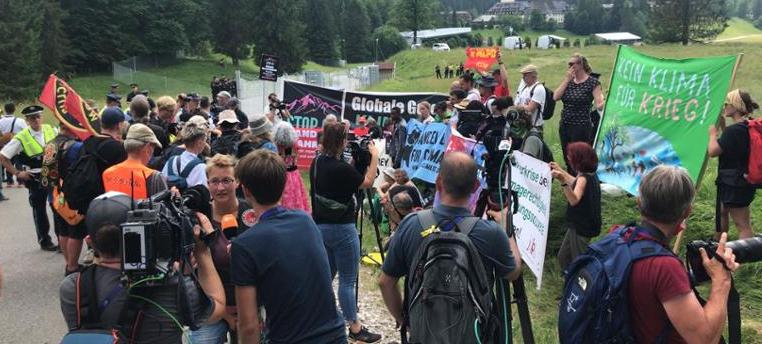
Protest outside G7 Summit, June 27, 2022
This year's G7 summit was hosted by Germany at Schloss Elmau (Elmau Castle), about 100 km south of Munich. The G7 is comprised of Canada, France, Germany, Italy, Japan, the UK and the U.S. The European Union has standing as a "non-enumerated member." Also present at this year's summit were the leaders of Argentina, India, Indonesia, Senegal, South Africa and Ukraine. The presidency of the G7 now passes from Germany to Japan, which will hold the next summit in 2023 in Hiroshima.
A persistent feature of this year's proceedings is the targeting of certain countries to isolate them politically and economically. This was especially true of Russia. Formerly known as the G8, Russia was suspended from the body following the 2014 referendum in Crimea which saw the people of that region vote to join Russia. In 2018, Russia announced its permanent withdrawal from the G8.
In a June 27 statement on Ukraine, the G7 described its military support for Ukraine as follows: "We will continue to coordinate efforts to meet Ukraine's urgent requirements for military and defence equipment. We will also continue to coordinate to provide Ukraine with the material, training and logistic, intelligence, and economic support to build up its armed forces."
In terms of financial and economic assistance for Ukraine, the G7 stated: "As G7, we have provided and pledged more than U.S.$2.8 billion in humanitarian assistance so far in 2022. [...] As of today we are ready to grant, or have pledged and provided up to U.S.$29.5 billion of budget support in 2022 [...] Overall, this support is urgently needed and comes on top of the economic support provided since 2014 until 2021, which exceeds U.S.$60 billion. [...] We look forward to additional planned support to Ukrainian state-owned enterprises and the private sector through the European Bank for Reconstruction and Development (EBRD) and the International Finance Corporation which amounts to U.S.$3.5 billion. [...]"
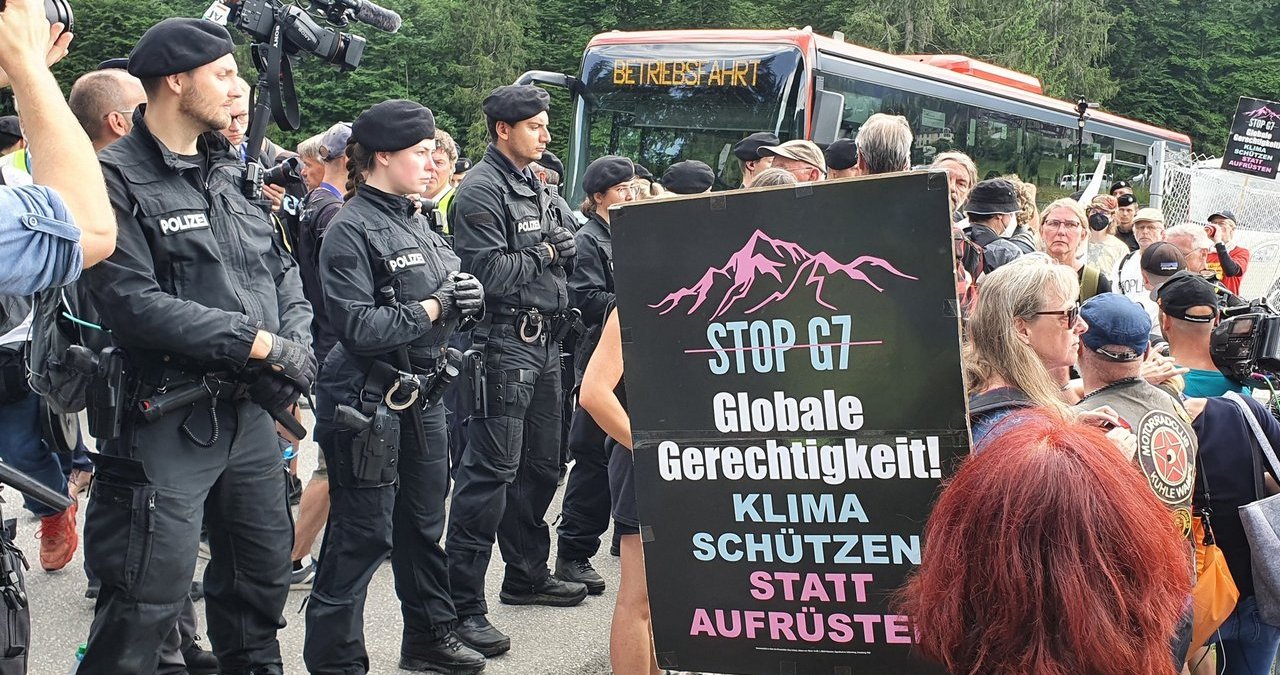
The G7 leaders' final communiqué emphasized the group's aim to impose "severe and immediate economic costs" on Russia and put a price cap on Russian oil to bar service providers such as shippers or insurers from dealing with oil priced above a fixed level. "We remain steadfast in our commitment to our unprecedented coordination on sanctions for as long as necessary, acting in unison at every stage," the leaders said.
For its part, Canada, represented at the summit by Prime Minister Justin Trudeau, "announced $151.7 million in new humanitarian, development, and peace and security support for Ukraine. This includes $75 million in humanitarian assistance to help get food, emergency cash and vouchers, protection, shelter and health services to Ukrainians. It also includes $52 million for agricultural solutions including grain storage units to help improve food security, $15 million to support lifesaving mine clearing efforts, and $9.7 million to support accountability for human rights violations. The Prime Minister also announced Canada will provide a $200 million loan to Ukraine through the International Monetary Fund to help meet its urgent liquidity needs. In addition, he announced $73 million in humanitarian assistance that Canada pledged on April 9, 2022, has now been allocated to address the crisis in Ukraine and neighbouring countries."
As concerns the natural environment, the leaders' final communiqué states a great deal about climate change and the environment. However, it does not say anything about the increasing militarization of the planet being led by the U.S. imperialists and NATO, the largest source of pollution on the planet. Furthermore, the G7's discussion of ending the use of fossil fuels is firmly situated in the sanctions regime against Russia.
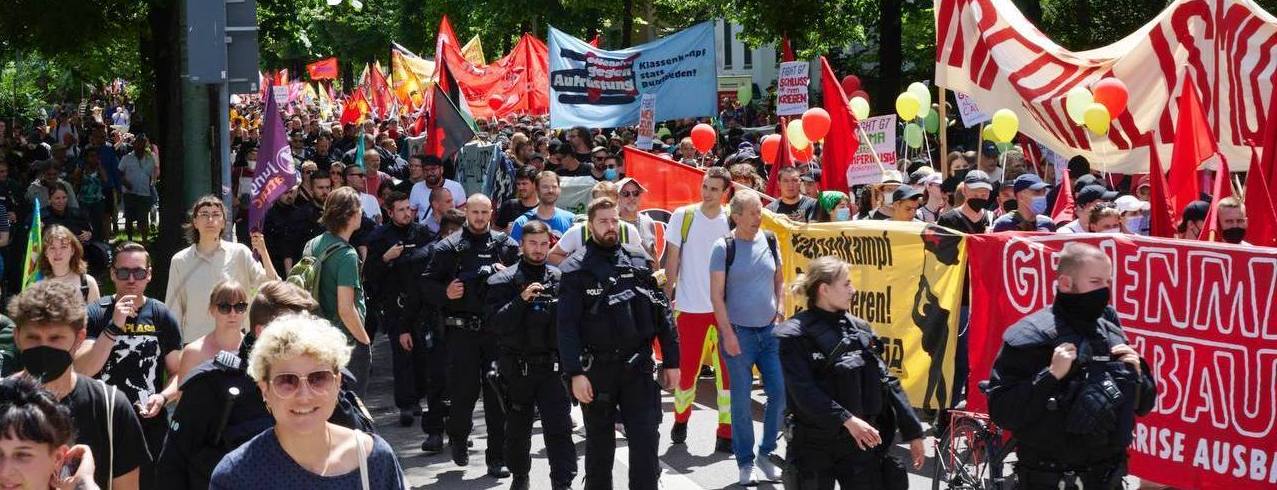
In another section called "Economic Stability and Transformation," the leaders claim that "Russia's war of aggression against Ukraine has exacerbated the economic impact of the COVID-19 pandemic crisis and impeded the recovery that began in the second half of 2021, by dragging down growth, causing significant increases in commodity, energy and food prices, and thereby pushing up inflation to levels not seen for decades."
Under the topic "Healthy Lives," the G7 leaders state, "To overcome the COVID-19 pandemic now, we reaffirm our commitment to enabling equitable global access to and delivery of safe, effective, quality-assured and affordable vaccines, therapeutics, diagnostics, and other essential medical goods." The crises in health care in G7 countries like the U.S. and Canada are not mentioned, only vague aspirational goals to "attain universal health coverage" and "strengthen health systems worldwide."
As concerns China, the G7 states: "We remind China of the need to uphold the principle of the UN Charter on peaceful settlement of disputes and to abstain from threats, coercion, intimidation measures or use of force."
Also directed at China is the U.S.-led proposal to raise U.S.$6 billion in the next five years, called the Partnership for Global Infrastructure and Investment (PGII). Its ostensible purpose is to finance infrastructure projects in developing countries. The PGII is seen by China and others as intending to counter China's Belt and Road Initiative (BRI), the global infrastructure development strategy adopted by the Chinese government in 2013 to invest in nearly 70 countries and international organizations, as a key component of China's foreign policy. As of March, there are said to be 146 countries that have signed up to take part in the BRI. News agencies noted that the G7 launched a similar project called Build Back Better World (B3W) a year ago at its 2021 summit, describing PGII as a relaunch of B3W.
The G7 says of the Democratic People's Republic of Korea (DPRK): "We urge the DPRK to engage in diplomacy and to resume dialogue towards complete denuclearization. We reiterate the urgent need for the DPRK to improve the humanitarian and human rights situation [...]" Since the end of the Korean War, the U.S. has refused to negotiate a peace treaty with the DPRK, while Canada has refused to engage with the DPRK diplomatically, instead taking part in the illegal U.S.-led naval blockade against the DPRK.
The G7 leaders also admonish the peoples of Iran, Libya, Syria in a similar fashion.
The G7 leaders conclude their communiqué with discussion of "Gender Equality" and "Extremism, Disinformation, Foreign Interference and Corruption."
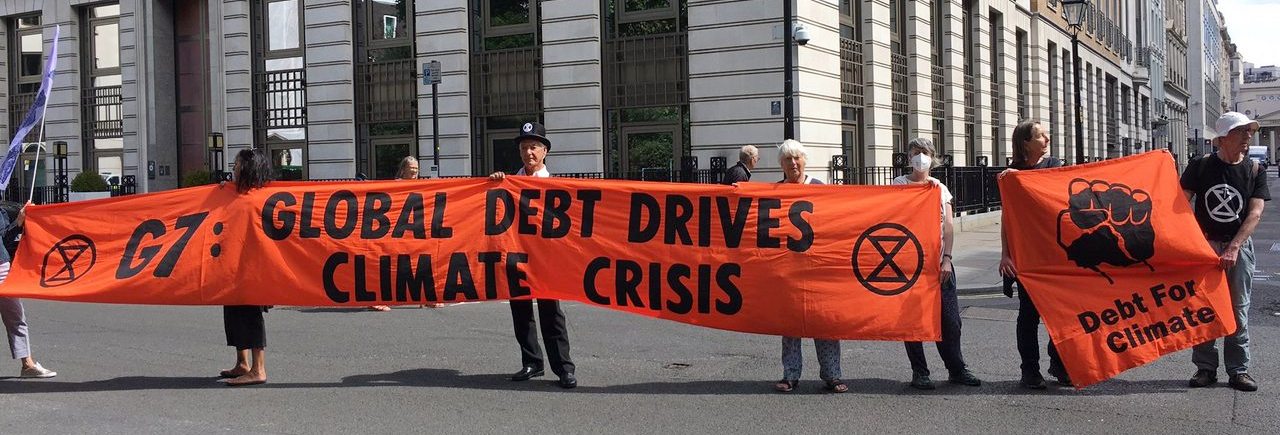
(Photos: Fuoco Savinelli, Debt for Climate, XR Money
Rebellion)
Responses to G7 Summit
Regarding the G7's attempt to impose a price cap on Russian oil, Deputy Prime Minister of Russia Alexander Novak, in an interview with the Rossiya-24 TV Channel, spoke about the creation of a so-called buyers cartel to limit Russian oil prices. He stated:
"In my opinion, this is the next attempt of interfering with market mechanisms, which can only entail a market imbalance and shortages. ... In turn, this will result in price growth and accordingly, to higher prices being paid for energy resources on the global market by European consumers, from G7 states in the first instance." He gave the example of an embargo on Russian coal, which resulted in shortages and higher prices. "Certainly, these are ill-devised, unjustified measures and they, as I said earlier, will only lead to growing burden of European consumers," he added.
Regarding the G7's negotiations with India and China to implement the price cap on Russian oil, news agencies report that India is unlikely to take part in such measures due to its national interests. A source explained to the Hindu, "Placing a price cap on Russian oil may result in Moscow cutting down on its exports to India as it may not be feasible for it to transact at reduced prices. So, while the Western nations may not be placing a sanction against the sale of oil, in effect the move could dent Russia's oil exports to India. There is no reason for New Delhi to accept this as it has been getting Russian oil at a competitive price."
The source added: "One must also think about what happens if Russian oil is not sold. The increased demand from the Middle East will make global prices sky rocket. Developing countries will then be forced to buy the higher-priced oil and it could ultimately lead to a global recession."
News agencies also report that the U.S. considers India essential for its Indo-Pacific strategy, which is aimed at dominating China. So it does not have a means to stop India from buying Russian oil as it pleases without jeopardizing this strategy.
China's Response to U.S. Attempts to Counter Its
Belt and Road Initiative
The U.S. and other G7 countries said they will raise U.S.$600 billion over five years to finance infrastructure projects in developing countries in the form of a program called the Partnership for Global Infrastructure and Investment (PGII). U.S. President Joe Biden said that the U.S. aims to mobilize $200 billion for the PGII project over the period through grants, federal funds and private investment to support projects that help tackle climate change, and improve global health, digital infrastructure and gender equity. Europe will mobilize 300 billion euros for the initiative, Reuters said.
A report in China's Global Times noted that "economists expressed skepticism over the feasibility of such a program, citing reasons such as the U.S.' strained government debt status, poor infrastructure construction abilities and past failure with a similar project.
"They also criticized the G7 proposal for having an 'insincere' intention, as it was raised more from the perspective of launching a political competition with China, instead of really caring about the infrastructure situations in lower income countries."
The Global Times cited several experts from China to elaborate on these points.
"If the G7 group only targets China's overseas infrastructure market for competition, history will prove that this kind of top-level planning that lacks the concept of common development will only become another short-lived project," Wang Jianjiao, director of the economic and trade cooperation department under the Silk Road Academy of Social Sciences, told the Global Times.
Wang also noted that only when the U.S. gives up its global cooperation model, which often attaches "unequal additional conditions," gets rid of its own debt predicament and reinvigorates the U.S. real economy will it have a chance of competing with China in overseas infrastructure markets.
Qiu Wenxu, director of the industry development department under the Silk Road Academy of Social Sciences, said that if the U.S. government really intends to materialize the U.S.$200 billion in funding it says it will contribute to the PGII, it is unlikely to come mostly from private capital, as infrastructure projects have long investment cycles and relatively low yield rates, making them unattractive to private investors.
"However, at the current time when the U.S. government debt is at a critically high level and it has hardly any budget to invest in foreign-bound infrastructure, Biden still needs to raise most of the money from private companies. In this sense, it's very likely that the $200 billion fund can't be raised to the full amount," Qiu told the Global Times.
The difficulties in raising funds for such a project were already shown in the PGII's predecessor project Build Back Better World (B3W). An article by Foreign Affairs, for example, said that the B3W project has "languished," while a Guardian report noted that "little had been heard of" B3W since its launch.
According to Foreign Affairs, the U.S. commitments to global infrastructure renewal only came to about U.S.$6 million under the B3W project one year after its launch.
Qiu further stressed that the U.S. does not have advantages in infrastructure construction, pointing out that the U.S. has completed few large infrastructure projects at home in the past 10 years, not to mention abroad. For example, California's high-speed rail is tens of billions of dollars over budget and years behind schedule.
NATO Summit in Madrid, Spain, June 28-30
Aggressive U.S.-Led Alliance Expands
War Preparations
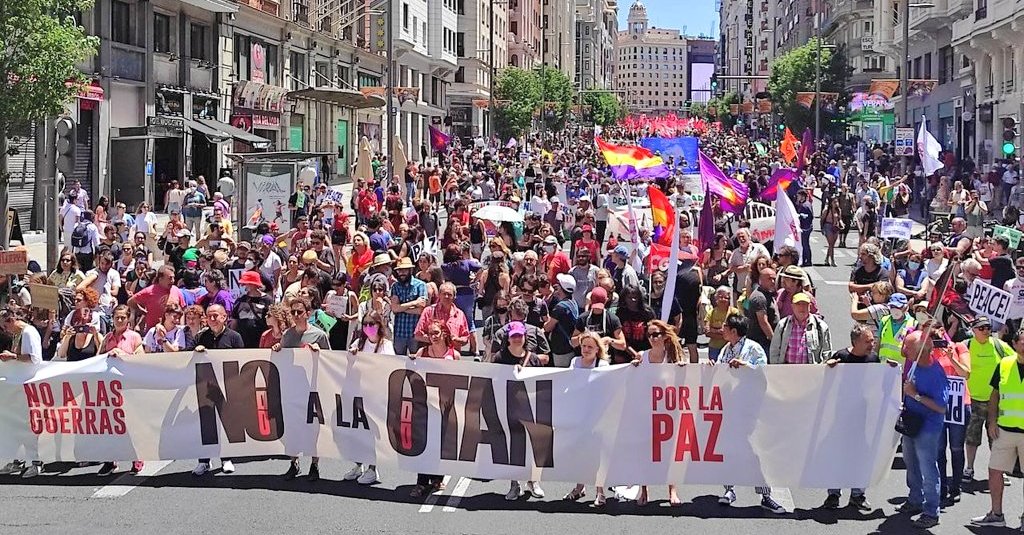
The U.S.-led NATO war alliance held its heads of state summit in Madrid, Spain, from June 28-30, to set the course for its war preparations in the coming period. Major developments at the summit included setting NATO's new "Strategic Concept" and the further expansion of NATO in Europe.
In remarks on June 29, NATO General Secretary Jens Stoltenberg gave an overview of discussions to come at the Summit:
"It will be a transformative Summit, because we will make historic decisions. We will agree [to] a new Strategic Concept for our Alliance, which is a blueprint for how to take NATO into the future in a more competitive and dangerous world, to protect all Allies and close to 1 billion citizens.
"We will agree [to] a fundamental shift to our deterrence and defence. With more forward deployed combat formations. With more high-readiness forces. And also with more pre-positioned equipment. This is the biggest overhaul [of] our collective defence since the end of the Cold War that will be agreed at this Summit.
"And thirdly, we will, of course, express our support to Ukraine. I am glad that President Zelenskyy will address all the leaders as we start the Summit today. And we will also agree on a Comprehensive Assistance Package for Ukraine. NATO and NATO Allies have supported Ukraine for many many years. But, of course, after the invasion we have all stepped up." Ukrainian President Volodymyr Zelensky addressed the summit leaders by video link. He called on NATO countries to provide Ukraine with modern missile and air defence systems to counter Russia's artillery.
Stoltenberg continued, "And then the leaders will also make an historic decision to invite Finland and Sweden to become members of NATO. And this is based on the agreement reached between Finland, Sweden and Türkiye yesterday. And this is a good agreement for Finland, Sweden, for Türkiye, and for all of us.
"And finally, we will recommit and take stock of the enormous progress that has been made when it comes to burden sharing, increased defence investments across the whole Alliance over the last years."
Besides the 30 heads of state from NATO members, also present were leaders from four countries in the Asia Pacific: the Prime Ministers of New Zealand, Australia, Japan and the President of south Korea. News reports state that Japanese Prime Minister Fumio Kishida told the summit that Japan wants to expand its cooperation with NATO in areas such as cyber and maritime security. Kishida said that he feels a "strong sense of crisis," claiming that China will create a similar situation in East Asia as the crisis in Ukraine for which Russia is blamed as the aggressor. "We must demonstrate unity so that such attempts will never succeed," he said.
New Strategic Concept
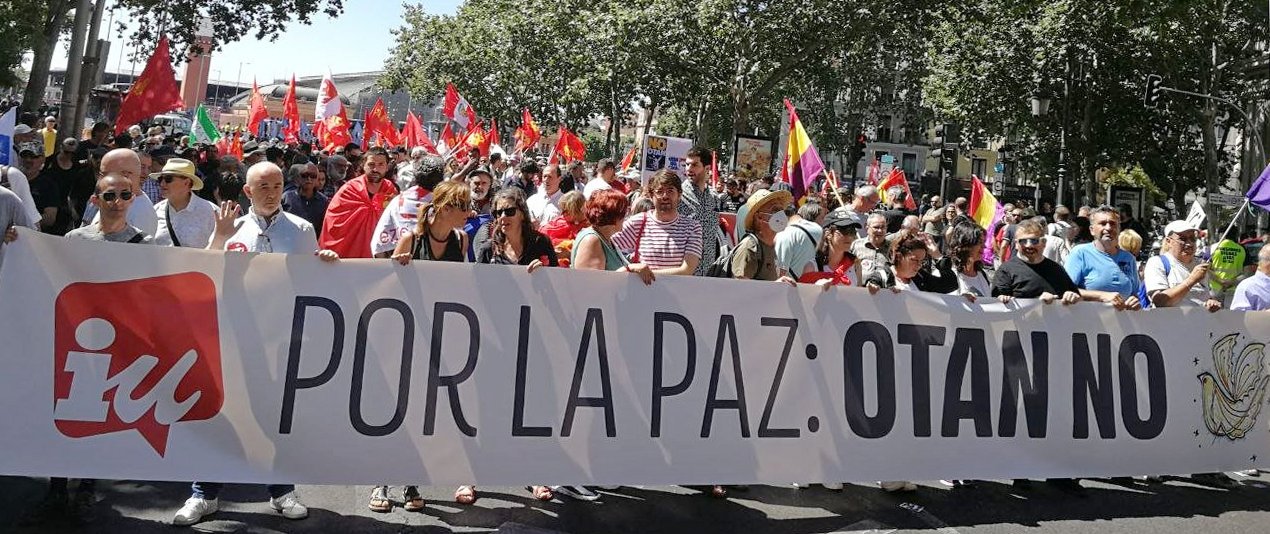
NATO claims to be a defensive alliance, denying the aggressive, Cold War anti-communist basis on which it was founded. This attempt to turn reality on its head is to justify NATO's relentless expansion, aggression and warmongering, against the wishes of the peoples of the world, to enforce U.S. imperialist dictate.
The summit had a profoundly threatening nature, seen in its new Strategic Concept, and was met with worldwide opposition. The 2022 Strategic Concept claims that the alliance is "the unique, essential and indispensable transatlantic forum to consult, coordinate and act on all matters related to our individual and collective security."
In speaking of the "Strategic Environment," the 2022 Strategic Concept claims, "Authoritarian actors challenge our interests, values and democratic way of life." It is particularly preoccupied with Russia and China, claiming that "The Russian Federation is the most significant and direct threat to Allies' security and to peace and stability in the Euro-Atlantic area," and that "The People's Republic of China's (PRC) stated ambitions and coercive policies challenge our interests, security and values."
The Strategic Concept defines NATO's three core tasks as: deterrence and defence; crisis prevention and management; cooperative security. It is clear to see what these "core tasks" mean in practice. Take for example NATO's 1999 bombing of Serbia; its invasion and 20-year occupation of Afghanistan; its 2011 bombing of Libya and the 2014 political takeover and arming of Ukraine to provoke conflict with Russia.
The adoption of this Strategic Concept underscores the anti-democratic nature of NATO, in which decisions taken by this supranational body are simply to be implemented by its members: "We will share equitably responsibilities and risks for our defence and security. We will provide all the necessary resources, infrastructure, capabilities and forces to deliver fully on our core tasks and implement our decisions. We will ensure our nations meet the commitments under the Defence Investment Pledge, in its entirety, to provide the full range of required capabilities. We will build on the progress made to ensure that increased national defence expenditures and NATO common funding will be commensurate with the challenges of a more contested security order."[1]
During the summit, member states agreed to increase the number of soldiers in a high state of readiness from 40,000 to 300,000, while also deploying more heavy weaponry in Baltic states and Poland.
Membership Applications from Sweden and Finland Accepted
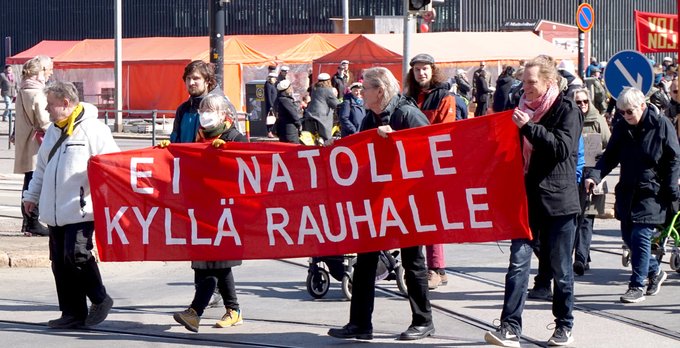
Anti-NATO protest May 1, 2022, in Helsinki, Finland
Both Sweden and Finland applied for NATO membership in mid-May, citing an alleged threat from Russia as the reason for giving up their official neutrality.
NATO members must unanimously accept applications for membership and Türkiye's initial position was that it would block these membership applications because of these countries' support for individuals associated with the Kurdistan Workers' Party (PKK), which it views as a terrorist organization. Türkiye also demanded the two Scandinavian countries lift arms embargoes put in place after Turkish incursions into Syria, and called for the extradition of individuals granted political asylum in Finland and Sweden who are accused by Türkiye of taking part in a failed 2016 coup attempt.
Finnish President Sauli Niinisto on June 28 announced that
Türkiye agreed to support Finland and Sweden joining the NATO
military alliance. For its part, Türkiye issued a statement
saying that it "got what it wanted," and that it had "made
significant gains in the fight against terrorist organizations."
However, as of September 16, the talks for NATO accession of the two countries are at an impasse, after Turkish President Recep Tayyip Erdogan said in mid-July that his country would block the membership bids if the two countries do not follow through on their commitments, specifically saying that Sweden is "not showing a good image." The three countries met on August 26 in Finland to try to resolve their differences. Finland's Foreign Minister Pekka Haavisto said the meeting aimed to establish contacts and set goals for cooperation that the countries agreed to in June. News agencies report that the three countries will continue to meet in the coming months to discuss security concerns that Türkiye has raised.
Changes in U.S. Posture in Europe
U.S. President Joe Biden made a prominent announcement about enlarging the U.S. troop presence in Europe as part of setting the tone for the summit, following opening remarks by Stoltenberg.
Biden said he will increase the number of U.S. destroyers based at Rota Naval Base, Spain from four to six. "In Poland, we're going to establish a permanent headquarters of the U.S. Fifth Army Corps and strengthen NATO interoperability across the entire eastern flank," he said. The so-called eastern flank refers to NATO member countries in eastern Europe that border Russia.
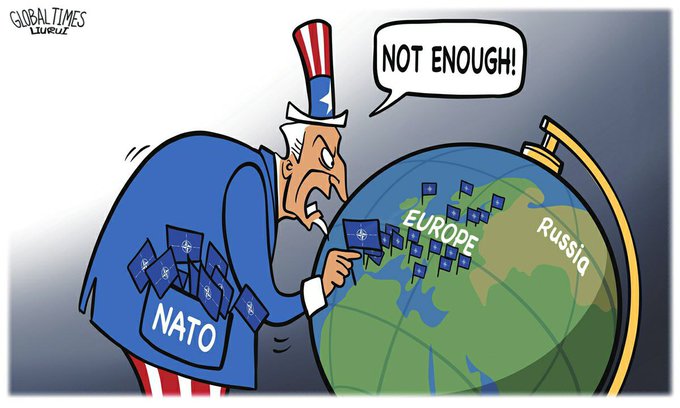 The Army's V Corps headquarters will be a
forward command post, an Army garrison headquarters, and a field
support battalion, said U.S. Department of Defense (DOD)
officials attending the summit. "The forces will improve command
and control capabilities, interoperability with NATO, and
management of prepositioned equipment," according to the DOD,
which added, "This enables DOD to deploy combat forces up and
down the eastern flank."
The Army's V Corps headquarters will be a
forward command post, an Army garrison headquarters, and a field
support battalion, said U.S. Department of Defense (DOD)
officials attending the summit. "The forces will improve command
and control capabilities, interoperability with NATO, and
management of prepositioned equipment," according to the DOD,
which added, "This enables DOD to deploy combat forces up and
down the eastern flank."
A news release from the U.S. DOD on June 29 states: "In Romania, the United States will position a rotational brigade combat team. This additional brigade will also maintain the ability to deploy subordinate elements. The U.S. will also enhance its rotational deployments in the Baltic republics. These include armoured, aviation, air defence and special operations forces.
"The U.S. military will also maintain a persistent, heel-to-toe presence in the region and will intensify training with Baltic allies to maintain combat-credible capabilities, officials said.
"Biden also announced deployment of two additional F-35 squadrons to RAF Lakenheath in the United Kingdom. These fifth-generation fighters will add to the air support for NATO forces throughout Europe.
"The president said he will also deploy additional air defence, logistics and engineer assets in Germany and add air defence capabilities to forces in Italy."
Biden's announcement follows a surge of 20,000 U.S. troops to Europe since the conflict in Ukraine began at the end of February. There are now more than 100,000 U.S. troops serving in Europe with many in eastern European countries.
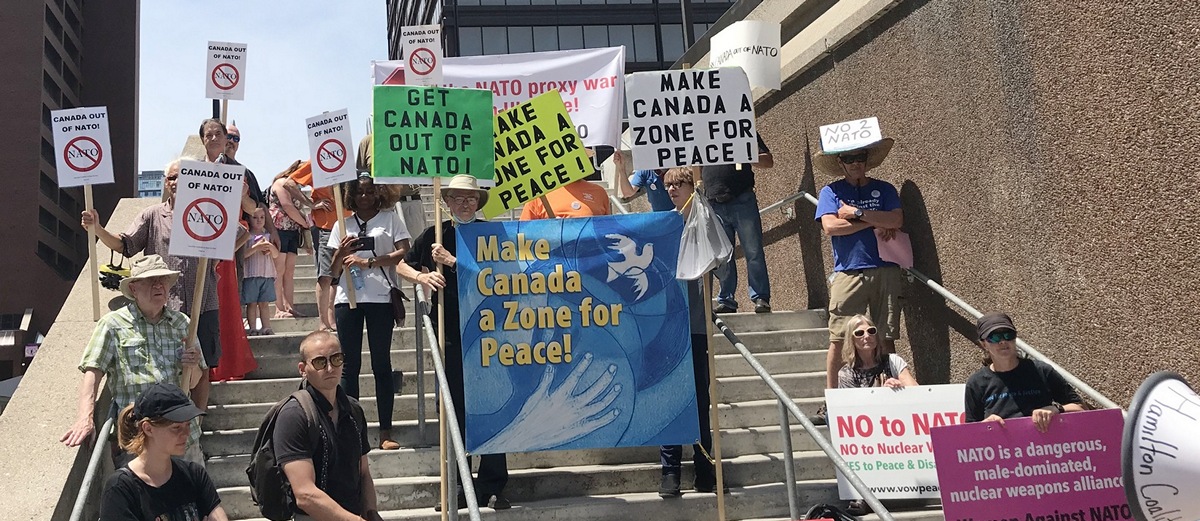
Anti-NATO action in Hamilton, June 25, 2022. Actions took place
across Canada in opposition to the Madrid NATO Summit.
Note
1. NATO
2022 Strategic Concept.
(Photos: TML, OvlenysOV, A. Ocharro, Stop NATO, Global
Times)
Role of Japan at G7 and NATO Summits
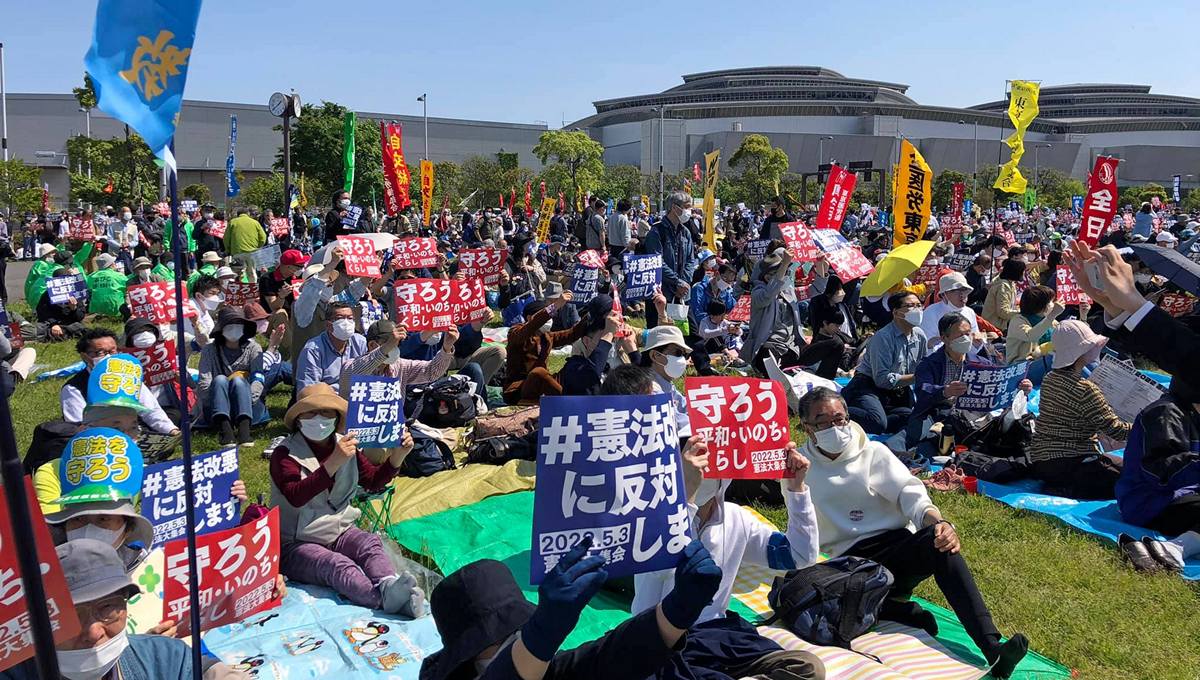
Anti-war protest in Japan, May 3, 2022
Japan, as the only Asian country in the G7, as well as a special guest at the NATO summit in Madrid, played a notable role in these bodies at their recent meetings, stepping forward as a key collaborator with NATO, the U.S. and big powers of Europe and their aims in the Asia Pacific.
Prime Minister Fumio Kishida, before departing Madrid to return to Japan, spoke to reporters about his participation in the two summits: "I confirmed the awareness that the security of Europe and the Indo-Pacific are inseparable, and that any change in the status quo by force will not be tolerated in any region." He added, "Participating in a summit where a new Strategic Concept has been finalized is of historic significance."
Japan at the NATO Summit and Threat of an "Asian NATO"
This was the first time Japan participated in a NATO summit. At this summit and at previous forums, such as the Shangri-La Dialogue on June 10 in Singapore, Prime Minister Kishida has been using disinformation about Russian aggression to not only support U.S. and NATO attempts to expand into eastern Europe and isolate Russia, but also to claim that China represents an analogous threat in the Asia Pacific, so as to justify NATO expansion into this region and Japan's own militarization.
News agencies state that NATO's new strategic concept mentions China for the first time, in which it is openly cited as a threat. A senior official of the Japanese Foreign Ministry told Yomiuri Shimbun, "In some respects, the fact that Japan has been pushing for increased vigilance toward China suggests our efforts have been successful."
NATO's strategic concept states in part: "The People's Republic of China's (PRC) stated ambitions and coercive policies challenge our interests, security and values. The PRC employs a broad range of political, economic and military tools to increase its global footprint and project power, while remaining opaque about its strategy, intentions and military build-up. The PRC's malicious hybrid and cyber operations and its confrontational rhetoric and disinformation target Allies and harm Alliance security. The PRC seeks to control key technological and industrial sectors, critical infrastructure, and strategic materials and supply chains. It uses its economic leverage to create strategic dependencies and enhance its influence. It strives to subvert the rules-based international order, including in the space, cyber and maritime domains. The deepening strategic partnership between the People's Republic of China and the Russian Federation and their mutually reinforcing attempts to undercut the rules-based international order run counter to our values and interests."
Japan's Role at the G7
Prior to the NATO summit, Japan attended the G7 summit in Elmau, Germany, where similar hostility toward China was expressed in the final leaders' communiqué. It states "there is no legal basis for China's expansive maritime claims in the South China Sea" and calls on China to "fully comply with the arbitral award of July 12, 2016 and to respect navigational rights and freedoms enshrined in [the United Nations Convention on the Law of the Sea]. It calls on China to "uphold its obligations under international law and to contribute to international security. We remind China of the need to uphold the principle of the UN Charter on peaceful settlement of disputes and to abstain from threats, coercion, intimidation measures or use of force."
At the G7 summit, Kishida also put pressure on the Democratic People's Republic of Korea, calling for "complete, verifiable and irreversible destruction of all weapons of mass destruction." He called for greater action in order to prevent "north Korea believing that this is an opportunity to advance its nuclear and missile programs."
In a June 26 op-ed for German newspaper Frankfurter Allgemeine Zeitung, Kishida stated that "Japan will further expand the diplomatic and security role it plays in order to fully defend the peaceful order of both the region and the world. [...]
"Feeling a strong sense of crisis that 'Ukraine today may be East Asia tomorrow,' I myself took the decision to change our policy towards Russia. And, given the increasingly severe security environment in East Asia, I am determined for us to draw up a new National Security Strategy by the end of 2022 and fundamentally reinforce our defence capabilities within five years.
"There is no country on earth that can, only by itself, ensure its own security. I will actively engage in diplomacy at the summit level and vigorously pursue 'realism diplomacy for a new era,' operating diplomacy and security as two sides of the same coin."
Japan's stepped-up role against China and the DPRK at the recent summits comes amidst the ongoing pressure from reactionary forces in Japan that Article 9 of the Japanese constitution, that enshrines the pacifist nature of its armed forces as strictly for self-defence, should be eliminated. These same forces are also dead set against the Japanese militarists being held to account for their brutal crimes against the peoples of Asia.
Japan now takes up the presidency of the G7 and will host its next summit in Hiroshima in May 2023, with the focus said to be on peace and nuclear disarmament.
(With files from The Diplomat, Frankfurter Allgemeine Zeitung. Photo: Zehroren)
Threats to Democratic People's Republic
of Korea on Summit Sidelines
A notable meeting took place between U.S. President Joe Biden, Republic of Korea President Yoon Suk-yeol and Japanese Prime Minister Fumio Kishida on the sidelines of the NATO summit on June 29. News agencies report that the three countries agreed that the Democratic People's Republic of Korea's (DPRK) nuclear deterrent and missile programs "posed serious threats to not only the Korean Peninsula but also East Asia and the world" and that they would resort to further aggressive means to put pressure on the DPRK to abandon these programs. Of course the monopoly media did not report that the DPRK was forced to resort to such programs due to U.S. nuclear threats, other forms of aggression and its refusal to negotiate in good faith.
News reports state that China was not the subject of these three-way talks, because President Yoon does not want to be seen as hostile toward China. Furthermore, it is said that ongoing tensions between the Republic of Korea and Japan almost precluded the meeting, which had to be carefully stage-managed by U.S. diplomats.
A spokesperson for the DPRK Foreign Ministry addressed this meeting of the three countries at the NATO summit on July 2 in response to a question from the Korean Central News Agency. He remarked that this increased pressure on the DPRK comes at the same time as the Rim of the Pacific (RIMPAC) war games were taking place, June 29 - August 4. RIMPAC is considered the largest international maritime warfare exercise. It was followed by the largest war games in years by the U.S. and south Korea taking place from August 22 - September 1, including “joint invasion” exercises directed at the DPRK.
The spokesperson noted that the meeting discussed "dangerous joint military countermeasures against the DPRK including the launch of tripartite joint military exercises, taking issue with its legitimate exercise of the right to self-defence." He further pointed out:
"The recent NATO summit more clearly proves that the U.S. pursues a plan to contain Russia and China at the same time by realizing the 'militarization' of Europe and forming a military alliance like NATO in the Asia-Pacific region and keeps the U.S.-Japan-south Korea tripartite military alliance as an important means to realize this plan."
He denounced the joint military activities of the three countries as reckless, saying "a dangerous situation, in which a nuclear war might break out simultaneously in Europe and the Asia-Pacific region, has been created and the world peace and security have been put in the most critical condition since the end of the Cold War."
The so-called threat from the DPRK "is to provide an excuse for attaining military supremacy over the Asia-Pacific region including the Korean Peninsula, and furthermore, the rest of the world," he added. He affirmed that the DPRK will defend its sovereignty and "fulfill its responsible duty to ensure peace and security in the Korean Peninsula and the region."
(With files from KCNA)
G20 Foreign Ministers Meeting in Bali, Indonesia, July 7-8
U.S. Fails to Rally Support for
"Rules-Based International Order"
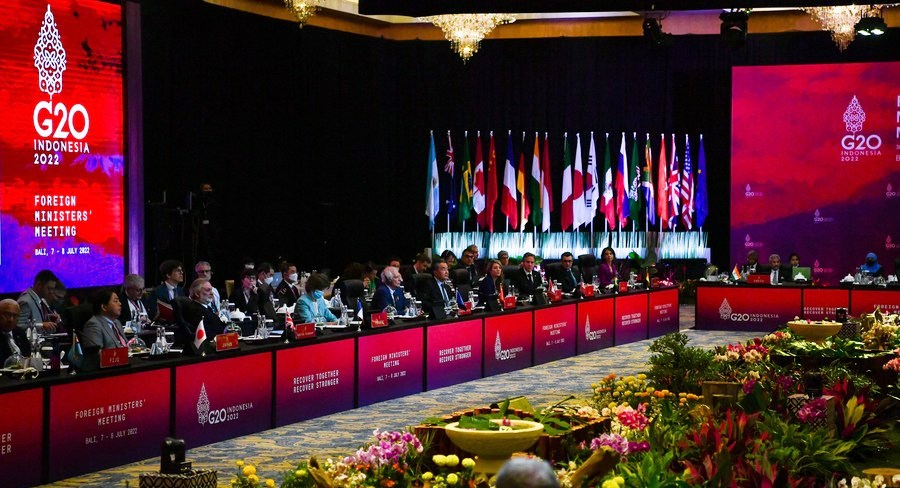
The meeting of foreign ministers of the G20 in Bali, Indonesia on July 7-8 under the theme "Recover Together, Recover Stronger," failed to achieve U.S. objectives.
A U.S. State Department Fact Sheet issued July 6 highlights three considerations for the U.S. at the G20: First, the G20 "provides a platform for the United States to engage directly with the world's largest advanced and emerging economies to promote U.S. interests and meet global challenges." Second, the U.S. commitment to multilateralism, i.e. "a multilateral vision for advancing the rules-based international order," and third, "supporting Ukraine and addressing global impacts from Russia's full-scale Invasion" which it calls an "affront to the international rules-based order."
U.S. efforts to cajole or bully other countries to sign onto its "rules-based international order" and support the U.S./NATO militarization and sanctions against Russia did not succeed. Interestingly, unlike most G20 meetings, no communique or report on this meeting was published.
Russian Foreign Minister Lavrov, in a statement on July 8, said that there were two major topics discussed: "The first topic is the crisis of multilateralism and the need to take all possible measures to overcome this crisis and return to the principles enshrined in the UN Charter -- specifically, the sovereign equality of all states and the resolution of issues through negotiations. During the second session, we discussed the current situation with food and energy security." He added that, "We have the UN Charter and the Western concepts of a so-called rules-based order set to undermine the Charter. Nobody has seen these rules. They have been shown to nobody. We drew attention to this fact at the meeting and called for returning to the origins of international law."
The meeting of the foreign ministers was one of a series of meetings of working groups and ministers with different portfolios, including finance ministers and bank governors, ministers of trade, education, labour and others, held since February in preparation for the 17th G20 Heads of State and Government Summit which will be held in Bali from November 15 to 16. The summit is described as "the pinnacle of the G20 process and intense work carried out within the Ministerial Meetings, Working Groups, and Engagement Groups throughout the year."
Among the foreign ministers that attended were U.S. Secretary of State Antony Blinken, Russian Foreign Minister Sergey Lavrov, Chinese Foreign Minister Wang Yi and Canada's Minister of Foreign Affairs, Mélanie Joly. Foreign ministers from India, South Africa and Brazil, all of which have refused to join the U.S./NATO condemnation and sanctions against Russia, were also in attendance. Leading up to the meeting the Associated Press speculated that the meeting could exacerbate existing divides over the Ukraine conflict as "unlike in recent leader-level meetings with NATO partners and other like-minded partners, Blinken will find himself among diplomats from countries wary of the U.S. approach to Ukraine and concerned about its impact on them... " It expressed particular concern about India "which has increased purchases of Russian oil even as the U.S. and Europe have tried to choke off that revenue stream for Moscow."
The U.S. is pushing that Russian Federation President Putin should not attend the November summit and pressuring Indonesia to invite Ukrainian President Volodymr Zelenskyy to attend if he does.
A number of bilateral meetings took place during the two days, including a five-hour meeting between the Chinese Foreign Minister and U.S. Secretary of State Blinken.
The meeting of G20 foreign ministers was one of several meetings held in Indonesia this year. Indonesia is the Chair of the G20 for 2022, from December 1, 2021 until November 30 when the Chair for 2023 will be assumed by India.
Canada's Participation
As concerns Canada's participation, a July 5 Global Affairs Canada press release made clear that one of Minister Joly's main preoccupations would be to champion Ukraine's cause in the NATO-instigated conflict with Russia, as well as oppose the reasons Russia gives to explain its actions in Ukraine which Canada refers to as Russian disinformation.
The Global Affairs press release stated that Minister Joly would "reiterate the principle of sovereign equality for all states and the importance of upholding international rules and institutions." This is precisely what Canada does not do but claims it does so as "one of the architects of the system that has supported global stability for decades." A Global Affairs press release following the meeting quoted the Canadian Foreign Minister as saying that "it was critical for Canada to use its diplomatic power to bring countries from all around the world together to find solutions to pressing global issues, including food and energy security, to build a better, more secure and more prosperous future." Without naming them, the press release stated that Minister Joly met with a number of her counterparts.
The Ministry of the Foreign Affairs of the People's Republic of China notes that Chinese Minister Wang Yi met with Minister Joly at the latter's request. The Chinese Foreign Ministry reports that "Joly said that Canada attaches importance to Canada-China relations and is willing to work with China to respect each other, strengthen communication, cooperate in a pragmatic manner to address common concerns and promote bilateral relations back on the right track. The two countries have benefitted a lot from the close economic and trade exchanges between Canada and China. Both sides maintain close coordination and cooperation in multilateral affairs such as climate change and biodiversity. Canada supports multilateralism and advocates following the purposes and principles of the UN Charter. At this critical moment when global peace and security are faced with challenges, we hope that China, as a permanent member of the Security Council, will play an important role.
"Wang Yi said that China-Canada relations have long been at the forefront of China's relations with developed countries, bringing tangible benefits to the people of both countries. China and Canada have never been rivals, but partners, and China has never been a threat, but an opportunity. A sound and stable China-Canada relationship is the common expectation of the two peoples and also conforms to the common interest of both sides. China values the positive remarks of the Canadian side and hopes that they will be put into action. The Chinese side hopes that the Canadian side will respect the facts on China-related issues, speak and act with prudence, earnestly respect each other, meet China halfway, take the long-term perspective, enhance understanding, eliminate misunderstandings, build mutual trust, and promote China-Canada relations back on the right track.
"Wang Yi said that both China and Canada advocate upholding multilateralism, support greater democracy in international relations and uphold the trend of globalization. The two sides can carry out more coordination and focus on more positive energy to jointly promote the success of the second part of the 15th meeting of the Conference of the Parties to the United Nations Convention on Biological Diversity, strengthen cooperation in combating the pandemic and build a global community of health for all."
(Photo: Xinhua)
Indo-Pacific Chiefs of Defense Conference in Sydney, Australia, July 25-27
U.S./NATO Threatens Peace in Indo-Pacific Region
The 24th annual Indo-Pacific Chiefs of Defense (CHODS) conference took place in Sydney, Australia from July 25-27. It took place during the 2022 Rim of the Pacific (RIMPAC) exercises held from June 29 to August 4 which the U.S. Navy describes as "the world's largest international maritime exercise." RIMPAC was used by the U.S. to set the stage for an increase in U.S. provocations against China including the visit of the Speaker of the House of Representatives, Nancy Pelosi, to Taiwan in August.
The theme for the conference was "Promoting the Rules-Based Order in the Indo-Pacific." It was said to focus on "climate change and security implications for the Indo-Pacific, advanced technologies and their impact on security, and the implications of the conflict in Ukraine." Senior military leaders from 27 countries participated. China was invited but did not attend. The U.S. anti-China discourse was so pronounced and boorish, it is obvious why it did not attend.
Mark Milley, chairman of the U.S. Joint Chiefs of Staff, one of two senior U.S. military leaders to attend, told the press that the military leaders were focused on "the whole situation with the rise of China, a free and open Pacific." The Diplomat reports that during a press conference on July 27 "Milley expanded on comments he made last week about China's increasing aggressiveness in the region and the need for nations to ensure that the Pacific remains free and open to all.... China's activity, he said, 'seems to imply that they want to bully or dominate, as opposed to having a free and open' Pacific.
"Asked whether the U.S. would increase its military presence in Australia or in other partner nations, Milley and Campbell said the discussions are ongoing and no decisions have been made. There are about 2,200 U.S. Marines in Darwin."
Canada's role at the conference has gone unreported. No mention of its role is made in reports on proceedings from the U.S. and Australian militaries, nor does the meeting merit mention on the website of Canada's Department of National Defence. The Twitter account of General Wayne Eyre, Canada's current Chief of Defence, also makes no mention of the conference.
It is noteworthy that for the first time, the U.S. Chair of the NATO Military Committee, Admiral Rob Bauer, attended the conference where he held meetings with NATO Partners Chiefs of Defence of Australia, Japan and Mongolia, the Vice-Chief of Defence of the Republic of Korea and the Commander of the U.S. Indo-Pacific Command. A NATO statement issued on July 28 quotes Bauer: "As the first Chair of the NATO Military Committee to ever attend this conference, it was a great honour to be included, but it also demonstrates the new reality that global problems require global solutions. We were able to share very interesting perspectives on common issues that we are all facing. Destabilising situations in the Indo-Pacific can easily have an effect in the Euro-Atlantic Region, and vice versa. Only by working together can we tackle these threats and work on viable and lasting solutions."
In other words, the conference was used for the U.S. and its allies, including Canada, to give themselves the right to transgress the national waters and airspace of sovereign countries in the Indo-Pacific in the name of upholding sanctions - which are both unjust and illegal. Their provocations and accusations against China, interference and increased military presence in the region interfere with peaceful relations between nations and increase the danger of war.
The conference was co-hosted by Australia's Chief of the Defence Force, General Angus J. Campbell and Commander U.S. Indo-Pacific Command, Admiral John C. Aquilino.
A press release issued by the Australian military following the conference reaffirmed that U.S. strategic objectives are the reference point for its "partners" in the Indo-Pacific, in pursuing what Admiral Aquilino called "collective solutions to the real and evolving security environment we all face." The press release also cited Lieutenant-General Melvyn Ong, Chief of Defence Force, Singapore Armed Forces, as saying that the Defense Chiefs discussed and exchanged views on a wide range of security issues including climate security challenges, advanced technologies, and their impact on security cooperation and regional stability. "We have also reaffirmed our strong friendship and commitment towards addressing these contemporary security challenges together," he said. The press release goes on to state:
"During the conference, the Chiefs of Defense agreed to increase the complexity and frequency of mini-lateral training exercises, increase information sharing, and increase diversity in their ranks.
"Admiral Aquilino said the conference continued to foster the strong military-to-military relationships that enable the United States and its Allies and partners to cooperate effectively in the Indo-Pacific."
Participants included India, Peru, Singapore, Vietnam, Thailand, Indonesia, Japan, Cambodia, south Korea, U.S., France, Netherlands, Australia, Tonga, UK, Fiji, Canada, New Zealand, Bangladesh, Timor-Leste, Philippines, Nepal, Mongolia, Papua New Guinea, Malaysia, Chile, Brunei.
Video
Protests at G7 Summit in Germany
(To access articles individually click on the black headline.)
Website: www.cpcml.ca Email: editor@cpcml.ca


